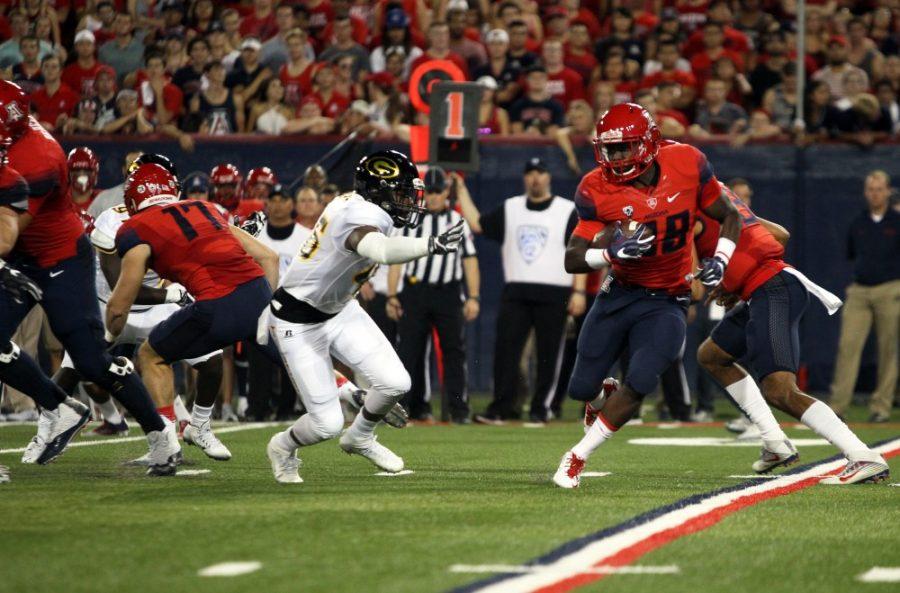The UA paid Grambling State University $575,000 to travel to Tucson for last weekend’s football game at Arizona Stadium, which featured their famous band during the half-time show.
“That’s accurate,” said Arizona’s Assistant Athletics Director Mike Parrish. “Pretty much right in line where a [Football Championship Subdivision] opponent is getting paid.”
FBS, or Football Bowl Subdivision, and FCS programs are determined by size of school. FBS used to be known as Division I-A and FCS was Division I-AA.
Ohio State and Alabama are two class names in the FBS, while North Dakota State has dominated the FCS for the last five years.
FBS teams pay hundreds of thousands of dollars for FCS teams to travel for a game they are likely to lose.
These games often occur during the first few weeks of the season before teams dive into their conference schedules.
Payday for FCS teams can range anywhere in the hundreds of thousands to over a million dollars. The intended benefit is that the FBS team fills its stadium for a home game and the FCS school gets additional cash flow to add to its limited budget.
This ongoing method of scheduling can be seen as a necessary part of college football for athletic departments.
FCS coaches can also use these games as a recruitment tactic to tell players they compete against top teams across the nation.
The outcomes are often not favorable for the smaller programs. The News Star reported that Grambling State was paid $600,000 to play California last year, a game they lost 73-14.
READ: UA athletics, UA mathematics team up to create statistics program
A team may occasionally overlook an FCS opponent, which can lead to upsets in the college football world. In 2006, for example, Appalachian State beat fifth-ranked Michigan with a blocked field goal—one of the biggest upsets in college football history.
A total of 105 games were played between the two subdivisions in 2015. FBS schools won 96 of the matchups against their FCS opponents, according toESPN.
Since the College Football Playoff’s inception in 2014, more emphasis has been put on strength of schedule. Now teams make sure they do everything they can to be in competition for the playoff.
The Big Ten Conference made the decision to not schedule FCS opponents this year, most likely an attempt to strengthen schedules when it comes to national rankings and the 13-person playoff committee. No other conference has made this decision to prohibit all FCS opponents from future schedules.
“We certainly take strength of schedule in consideration and that’s why with scheduling one Power Five team, we’re playing 10 in a season,” Parrish said.
Parrish said that Arizona’s schedule with 10 Power Five opponents doesn’t make the program feel that playing an FCS school lessens the overall strength of schedule.
“One thing we try to do is we try to balance the schedule,” Parrish said. “We’ve got conference games—we try to get a Power Five, a Mountain West level game and an FCS game.”
Aviv Tzalalihin, a pre-business freshman, said he would like to see the schedule have a different matchup with the money that was paid to Grambling State.
“I definitely would’ve liked to see a better matchup …” he said. “Definitely tougher opponents if they’re going to be spending that much money.”
More conferences may follow the Big Ten’s lead, but in turn, teams won’t necessarily be able to guarantee an extra home game like they can with FCS teams. That means a sizable chunk of revenue wouldn’t appear for the athletic department.
“These payoff games for these FCS schools here are important for them to be able to take care of their budget,” Parrish said.
Matt Koppinger, a nutritional science graduate student, said the guarantee games are not always blowouts and can be good for FCS teams.
“I think it’s probably good for these schools to get some money to help better their programs,” Koppinger said. “I think most of the time we’re expecting an easy win, and then that obviously didn’t happen last week.”
For now, universities are guaranteed to continue scheduling these games, especially when it counts toward win totals for teams needing six to become bowl-eligible.
Follow Shaq Davis on Twitter.









